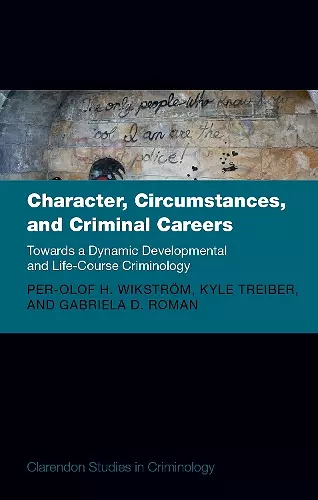Character, Circumstances, and Criminal Careers
Towards a Dynamic Developmental and Life-Course Criminology
Prof Per-Olof H Wikstrom author Prof Kyle Treiber author Dr Gabriela Roman author
Format:Hardback
Publisher:Oxford University Press
Published:8th Feb '24
Currently unavailable, and unfortunately no date known when it will be back

Why do young people engage in acts of crime and what is it that drives their criminal careers? These are the key questions addressed in Character, Circumstances, and Criminal Careers which explores and explains people's criminal careers through adolescence into young adulthood. Guided by Situational Action Theory (SAT)'s Developmental Ecological Action (DEA) model, the work analyses longitudinal data from the Peterborough Adolescent and Young Adult Development Study (PADS+), testing various hypotheses about the causes and drivers of people's crime involvement and criminal careers. Character, Circumstances, and Criminal Careers makes an argument for a more dynamic Developmental and Life Course criminology (DLC) by theorising and exploring the relationship between individual characteristics and environmental features and their changes across adolescence and into young adulthood. The book considers whether childhood predictors, such as social disadvantage and social adversity, affect different trajectories of crime involvement. It also presents a special analysis of the age-crime curve and its explanation. The book includes the most recent and updated statement of Situational Action Theory and its DEA model, including comparisons between the basic assumptions and propositions of SAT and selected major criminological theories (social bond and self-control theories, differential association and learning theories, rational choice theory and the theory of moral disengagement). Character, Circumstances and Criminal Careers presents an original theory, a uniquely detailed contemporary longitudinal study, and novel research methods and analytical techniques, and applies these to derive innovative findings about the relationship between individual and environmental factors across a critical developmental period.
To summarize, SAT has evolved into a highly detailed and informative theoretical framework documenting the trajectories of young people's lives from early adolescence to early adulthood - a crucial part of their development. While 'Breaking Rules' previously had a clear impact on the increasing number of empirical tests of SAT, I am confident that this book will similarly influence the testing of the testable developmental hypotheses. * Lieven Pauwels, CrimRxiv *
This is obviously a provocative and, important book. The theory is credulous and, as a consequence, the burden of disbelief is high and now moves to the critics. Wikström, Treiber, and Roman have made a significant contribution here and the rest of us have a responsibility to study it, to test it, and to help explicate it. As a result, their work should help shape empirical criminology for decades. * Michael Gottfredson, International Criminology *
ISBN: 9780198865865
Dimensions: 223mm x 145mm x 38mm
Weight: 884g
624 pages